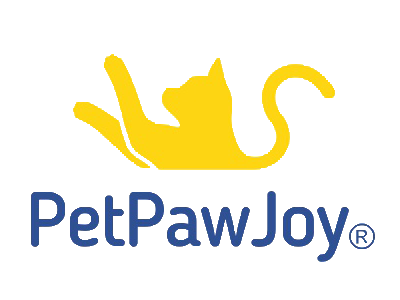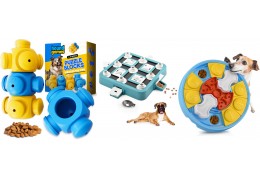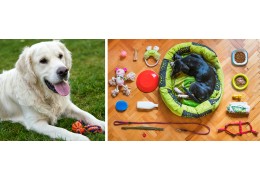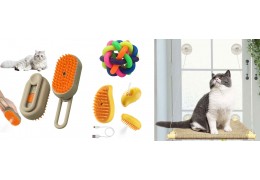Choosing the right small pet carrier is essential for your pet’s safety and comfort during travel. This guide...
The Importance of Chew Toys for Your Pet’s Dental Health
Maintaining your pet’s dental health is crucial for their overall well-being. Many pet owners overlook the significance of oral hygiene, but using chew toys, dental treats, and dog teeth cleaning products can significantly reduce plaque buildup and prevent dental diseases. In this guide, we will explore why chew toys are essential for your pet’s dental health and how they contribute to keeping their teeth and gums healthy.
Understanding Pet Dental Health
Just like humans, pets require proper oral care to prevent common dental problems such as plaque, tartar buildup, gum disease, and bad breath. Neglecting dental hygiene can lead to severe health issues, including infections and tooth loss. Chew toys provide a natural and effective way to promote dental hygiene without requiring constant brushing.
1. Establishing Basic Obedience Commands
1. How Chew Toys Promote Dental Health
Chew toys play an important role in maintaining your pet’s dental hygiene. They offer several benefits, including:
• Reducing Plaque and Tartar: When your pet chews on a toy, the friction helps scrape away plaque and tartar from their teeth.
• Strengthening Gums: Regular chewing exercises the jaw and strengthens the gums, preventing periodontal diseases.
• Preventing Bad Breath: Bacteria buildup in the mouth can lead to bad breath. Chewing naturally cleans teeth and reduces odor-causing bacteria.
• Encouraging Healthy Chewing Habits: Providing appropriate chew toys prevents pets from chewing on furniture or other household items.
2. The Role of Dental Treats in Oral Hygiene
Apart from chew toys, dental treats serve as another effective tool for maintaining oral health. These treats are specifically designed to clean teeth while being chewed.
• Abrasive Texture: Many dental treats have a textured surface that helps scrub away plaque and food debris.
• Enriched with Enzymes: Some treats contain active ingredients that fight bacteria and promote fresh breath.
• Tasty and Nutritious: Unlike regular treats, dental treats offer both a delicious taste and health benefits.
3. Dog Teeth Cleaning: Alternatives to Brushing
For pets that resist traditional brushing, dog teeth cleaning alternatives are available:
• Dental Chew Toys: Toys designed specifically for dog teeth cleaning have ridges and grooves that work like a toothbrush.
• Water Additives: Dental water additives help break down plaque and freshen breath.
• Dental Gels and Wipes: These products can be applied to your pet’s teeth to prevent tartar buildup.
4. Choosing the Right Chew Toys for Your Pet
Not all chew toys are created equal. Choosing the right type for your pet depends on their size, breed, and chewing habits. Here’s what to consider:
• Material: Look for non-toxic, durable materials that won’t break easily.
• Texture: A variety of textures, such as rubber nubs and rope fibers, can help clean teeth more effectively.
• Size: Choose a size appropriate for your pet to prevent choking hazards.
• Flavoring: Some chew toys are infused with flavors like chicken or peanut butter to encourage chewing.
5. The Impact of Poor Dental Hygiene
Failing to care for your pet’s teeth can lead to several health complications:
• Gingivitis: Inflammation of the gums caused by plaque buildup.
• Periodontal Disease: A severe infection that can result in tooth loss and pain.
• Heart and Kidney Issues: Bacteria from dental infections can enter the bloodstream, affecting major organs.
By incorporating chew toys, dental treats, and dog teeth cleaning routines, you can prevent these issues and ensure a healthier, happier pet.
6. Signs Your Pet Needs Dental Care
It’s essential to watch for warning signs that indicate dental problems, including:
• Bad breath
• Difficulty eating or chewing
• Red or bleeding gums
• Yellow or brown buildup on teeth
• Excessive drooling
If you notice any of these symptoms, consult your veterinarian for a professional dog teeth cleaning session.
7. Introducing Chew Toys to Your Pet
Some pets may be hesitant to use chew toys initially. Here’s how to encourage them:
• Start with a Soft Toy: For pets new to chewing, a softer toy can be more inviting.
• Use Treat-Dispensing Toys: Toys that release treats motivate pets to chew more.
• Incorporate Playtime: Engage your pet in interactive play to make chewing more exciting.
• Praise and Reward: Positive reinforcement can help pets associate chew toys with fun and rewards.
8. Additional Tips for Pet Dental Care
In addition to chew toys and dental treats, here are some extra tips to keep your pet’s teeth in great shape:
• Schedule Regular Vet Checkups: Annual dental exams help detect issues early.
• Provide a Balanced Diet: Nutritious food supports strong teeth and gums.
• Monitor Chewing Habits: Ensure that your pet is using the toys correctly and replace worn-out toys as needed.
9. Choosing Dental Care Products for Different Pets
Different pets require different dental care approaches. Here’s what to consider for each type:
• Dogs: Durable rubber chew toys, rope toys, and dental treats.
• Cats: Soft chewable toys infused with catnip, dental treats, and dental gels.
• Small Animals: Hay-based chews for rabbits and guinea pigs to promote natural tooth wear.
10. Myths About Pet Dental Health
Many misconceptions surround pet dental care. Here are some common myths debunked:
• “Dry food alone keeps teeth clean.” While kibble may reduce plaque slightly, it’s not a substitute for dog teeth cleaning or chew toys.
• “Pets don’t need dental care.” Just like humans, pets are prone to dental diseases if not properly cared for.
• “Bad breath is normal.” Persistent bad breath is often a sign of underlying dental issues and should be addressed.
Conclusion
Your pet’s dental health is just as important as their overall well-being. Incorporating chew toys, dental treats, and dog teeth cleaning routines can prevent common dental issues and ensure a healthier, happier life. Regular vet visits, a balanced diet, and proper oral hygiene habits will help maintain your pet’s teeth and gums for years to come. Start prioritizing your pet’s dental care today to keep their smile bright and their health in top condition!












